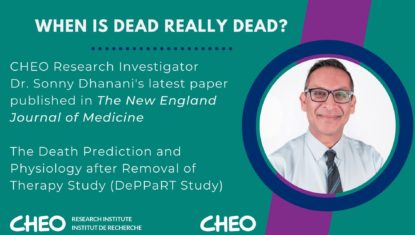27/01/2021
Ottawa, Ontario — Wednesday January 27, 2021

When Is Dead Really Dead?
The Death Prediction and Physiology after Removal of Therapy Study (DePPaRT Study)
A new international study, led by Dr. Sonny Dhanani published in the January 28 issue of the New England Journal of Medicine, documents the physiology of the dying process. Working closely with the Canadian Donation and Transplantation Research Program, The Canadian Critical Care Trials Group and the Ottawa Hospital Research Institute’s Dynamic Analysis Lab, the research team asked over 600 families to allow their loved ones in the ICU to have their vital signs monitored during the dying process. This is the largest international study of its kind.
This study is of interest to people all over the world with international coverage in The Guardian and VICE. As well as national Canadian coverage in The National Post, The Toronto Star, The Ottawa Citizen, and on science and tech websites like Gizmodo.
Why is a study like this important?
For families to choose organ donation when a loved one has died, they must be able to trust that death has really happened and that it is irreversible. Trust allows people to decide to donate at a time of grief and allows the medical community to feel comfortable opening a dialogue about donation. For donation after circulatory-determined death to be medically possible, death must be declared within a window of time after life-sustaining measures are withdrawn. Yet, stories persist about people “coming back to life” following a declaration of death, and there was little evidence to inform the medical understanding of dying.
What did the study find?
Dr. Dhanani and his team found that the classic “flatline” of death is not so straightforward. The study showed that cardiac activity often stops and re-starts several times during the dying process before it finally stops completely – but no one regained sustained circulation or consciousness. The study provides evidence to support the current standard to wait for 5 minutes after the heart stops before determining death and proceeding to organ donation.
